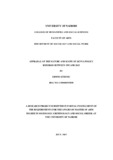| dc.description.abstract | Many initiatives have been instituted on police reforms in Kenya at policy level, however this had not translated to practical policing outputs especially by the time of post-election violence (PEV) conflict in 2008. Since its aftermath some progress has
been made in reforming policing: This progress includes development of
comprehensive plans for reforms and constitutionalizing some of them. However,
there exists a gap between the stated goals and what has been so far achieved.
Impunity has persisted, resources availed are inadequate and the political will to effect
the recommended changes is weak. There is need therefore for a study to appraise the
nature and scope of Kenya Police Reforms between 1995 and 2013 in order to
ascertain the implementation of the proposed Kenya police reforms. The study used descriptive survey research design. The target populations were police officers from both the Mainstream and Administration Police formations. The study sample size was 30 respondents that comprised of 5 senior police officers, 10 civil society officials, 10 officials from the judiciary and 5 officials from Ministry of Interior and Coordination of National Government. Purposive sampling technique was used to select the sample. Secondary data was cleaned from policy documents on police reforms made between 1995 and 2013. Data obtained was analysed using content analysis while quantitative data was analysed using descriptive statistics. It was found that the pace for the police reforms has been slow, as there is little evidence to show implementation of a comprehensive security policy. The bills enacted towards police reforms include; National Police Service Act, 2010, Independent Policing Oversight Authority Act, 2011, National Police Service Act, 2011, and Police Service Commission Act, 2011. The critical laws for initiation of police reforms have been passed and await systematic implementation. On its part, the Police Service has implemented various administrative reforms. The lack of fundamental reforms within the police force has sustained public dissatisfaction with the overall performance of the police. There has been some progress with the implementation of police reforms but the pace has been slow. The police are yet to adopt and implement best practices. The police still lack necessary communication infrastructure, adequate vehicles and equipments. The implementation challenges facing police reforms implementation were; lack of political will, corruption, poor capacity building and infrastructure, continued police impunity and structural
challenges. According to the civil society, there should be full inclusion of the public
in the planning, implementation and monitoring of the police reforms. On the other
hand, the police management views that planning, implementation and monitoring of
the police reforms as a police affair. The study recommends that police officers of all ranks should be integrated in the design and implementation of the reform process. That Police reforms should be fully institutionalized. That the management of the police service should strive to win the hearts and minds of police officers in the entire police service by developing a culture that supports the proposed police reforms. That the Government should provide adequate funding to police units, formations and Directorates to enable them perform their functions effectively. This is in addition to instituting adequate measures to deal with rampant corruption in the police ranks. | en_US |

